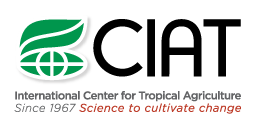Soils, foundation of prosperous societies
CIAT embraced the International Year of Soils 2015 as an opportunity to renew global awareness of the vital link between healthy, fertile soils and prosperous societies. We also carried the message beyond awareness to the need for research and action. Only if we bring degraded soils to life through better management, can they store water, deliver nutrients to crops, curb damage from natural disasters like floods, capture carbon, and provide all the other ecosystem services that are essential for sustaining and improving life.
CIAT actively joined the campaign to highlight the importance of soils for food security, climate, water availability and quality; and share the results of our research and actions across the tropics to restore degraded land, improve soil fertility and crop productivity, become climate smart, and fight poverty and hunger.

Putting farmers at the heart of healthier soils
Soil often remains a hidden “treasure,” meaning it frequently goes unnoticed, trampled and degraded without a voice. CIAT soil researchers aim to give soils and their major custodians, farmers, a voice. It is small-scale farmers who suffer the effects of land degradation and poor soil health the most – and, as guardians of 80 per cent of the world’s farmland, they must be included in the solution.
We put farmers at the heart of healthier soils to understand their needs, preferences, and aspirations, providing platforms for farmers to talk soils and tell their own soils stories. Farmers know best the constraints and opportunities and the missing pieces we can help fill and solutions we can co-create in order to move toward sustainable and equitable land management and livelihood improvements.
Layering these participatory approaches with cutting-edge soil science, CIAT soil researchers seek to understand and connect the multiple facets of soils from the field to the farm to the landscape level.
The power of participation
CIAT develops and applies a variety of participatory research approaches to help us find appropriate solutions:
Ghanaian farmers film their homegrown solutions for better yields – Soils https://t.co/itsWqDQRZz #Teachag pic.twitter.com/k4iNa90AMk
— The World Food Prize (@WorldFoodPrize) March 3, 2016
From the farmer to the world
From sharing soil practices on the “edutainment” show Shamba Shape Up and Twitter to linking farmers to consumers in Central America and engaging in global initiatives, CIAT has been busy advocating for soil beyond our project sites and farmers’ fields. CIAT is an active collaborator in the 4 pour mille soil carbon initiative, the “One World, No Hunger” initiative of the German Government (BMZ) and Initiative 20X20, a country-led effort in Latin America and the Caribbean, which aims to get the restoration of 20 million hectares of degraded land underway by 2020.
CIAT was also a strong voice at the Global Soil Week, engaging stakeholders from across the globe to share knowledge across disciplines and sectors around sustainable land management and the importance of land and soil to achieve the Sustainable Development Goals.
Restoring land on a large scale
CIAT is an active collaborator in a number of ambitious initiatives:
Agriculture has to be the solution to restoring degraded soils. We have no other alternatives. We are going to be using the land for agriculture. We have to make our agriculture more ecologically balanced so it becomes part of that solution.
Deborah Bossio
